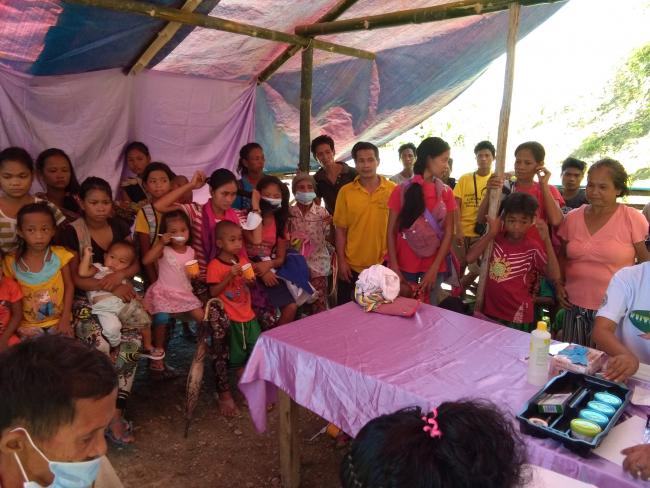Double duty: Raising awareness for rabies and screening for leprosy in Philippine indigenous populations
- Community News
A Philippine medical team recently conducted a combined rabies and leprosy awareness campaign, distributing pictographic flyers on rabies prevention while at the same time providing hygiene kits and medications for skin disease patients. The screening clinics took place on Palawan--the longest island and largest province in the Philippines.
This combined leprosy and rabies awareness campaign is the outcome of the training attended by the program managers of rabies and leprosy in Manila, which was conducted by the Research Institute for Tropical Medicine (RITM) and the Disease Prevention and Control Bureau of the Department of Health in partnership with GARC. The training equips program managers with the knowledge needed to screen and identify leprosy and other skin diseases as well as on animal bite management.
Palawan, dubbed as the Philippines’ last ecological frontier, serves as home to a UNESCO Heritage Site. In addition, it is also hailed as the world’s best and friendliest island. However, these titles can mask the reality that this province has issues that need immediate action, particularly in health.
Detached from the mainland of the Philippines, the province of Palawan is categorized as a geographically isolated and disadvantaged area (GIDA) and includes the large municipality of Rizal. The health situation of Rizal is characterized by limited resources; for example, in 2015, there were only 29 health personnel in the municipality with medical and paramedical training. Only one rural health unit provides treatment, consultation and dispensation of medicines, immunizations, sanitary campaigns, emergency treatment, health education, family planning activities and other preventive campaigns.
The municipality also has a high mortality rate due to the large percentage of indigenous peoples (IPs) who are not yet exposed to modern health practices. Rizal, at present, has only 19 health personnel, and they serve 13,639 households or a population of 54,576. Rizal also has one of the largest numbers of leprosy and animal bite cases that’s why the Provincial Health Office in coordination with the local government of Rizal conducted an awareness campaign on rabies and leprosy screening campaign in the area.
The activity was conducted on April 3 – 6, 2018 at Barangay Panalingaan and Sitio Ogis in Barangay Ransang. Over 85 people were screened for leprosy and other skin diseases, and in addition suspected leprosy cases were tested using the skin slit smear and if positive were provided with leprosy treatment. To raise rabies awareness, the team distributed pictographic flyers that included additional information on rabies.
Provincial Health Office will now include rabies information campaign and leprosy screening in the integrated infectious disease caravan that is annually conducted in Rizal. The caravan's main focus is tuberculosis, but it will now include HIV, rabies and leprosy going forward.
The training course on rabies, animal bite management and leprosy recognition was one of the programs of the GARC-led Communities Against Rabies Exposure (CARE) project which aims to integrate rabies prevention and control with other neglected tropical diseases such as leprosy. The CARE project was implemented through the support of the UBS Optimus Foundation.
Submitted by Eileen Grace N. Macabihag, RN, Rabies Program Manager who worked alongside other rabies/leprosy team members including: Emma P. Zabala, RM, Leprosy, Norry Fe-An T. Payopelin, RMT, Leprosy Medical Technologist, and Pamela L. Garcia, RN, MPA, MAN, Unit Head of the Infectious Diseases Unit.
